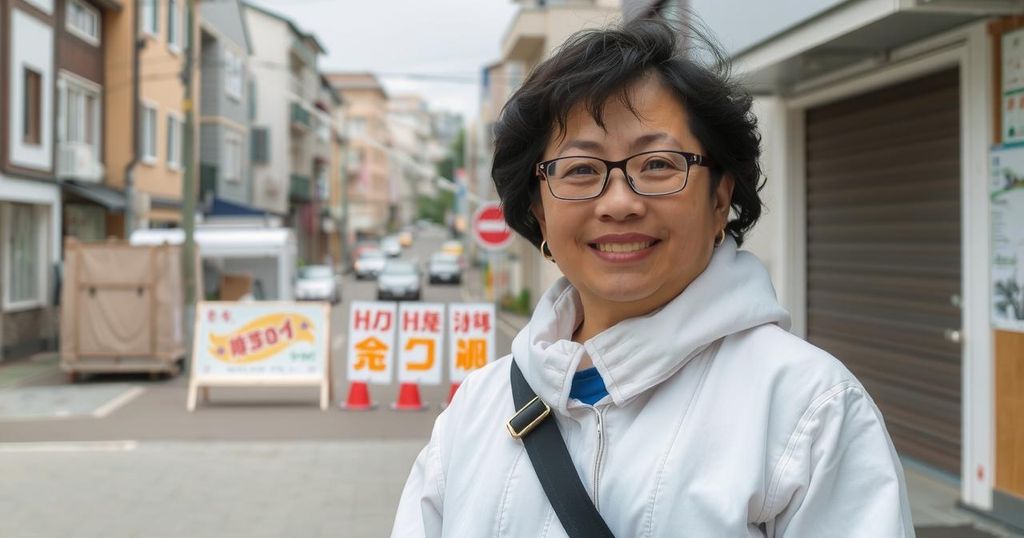Kobe City Official Advocates for Disaster Preparedness Following Noto Earthquake

Masayuki Fujisawa, a public relations officer from Kobe City, is dedicated to leveraging his experience from the Noto Peninsula Earthquake to promote disaster preparedness in Kobe. Having witnessed significant destruction in Suzu, he emphasizes the urgency of readiness and the psychological impacts of disasters. As he approaches his 30th birthday and the anniversary of the Hanshin Earthquake, his insights aim to foster a culture of preparedness within communities to mitigate the impacts of future seismic events.
In an initiative rooted in personal experience, Masayuki Fujisawa, a public relations officer from Kobe City, is dedicated to sharing the lessons learned from his deployment as a support worker in Suzu, Ishikawa Prefecture, following the devastating Noto Peninsula Earthquake last year. Born shortly before the 1995 Great Hanshin Earthquake, Fujisawa emphasizes the critical importance of disaster preparedness, a topic too often overlooked despite widespread awareness. His firsthand encounters in the aftermath of the quake compelled him to harness his experiences to inform and educate the residents of Kobe about the urgency of readiness in the face of natural disasters.
During his year-long service in Suzu, Fujisawa witnessed unprecedented destruction, with more than 3,800 structures affected by the seismic event which measured at the upper 6 on Japan’s seismic intensity scale. His profound realization of the vulnerabilities faced by communities after such disasters mirrors the experiences of his own family during the Hanshin Earthquake, reinforcing his commitment to conveying the seriousness of preparedness. His duties included managing public communications and engaging with victims, further accentuating the importance of support networks in disaster recovery processes. Fujisawa’s proactivity highlights how municipalities can benefit from the dedication of external support workers during significant recovery periods.
Fujisawa’s mission is particularly poignant as he approaches his 30th birthday, coinciding with the upcoming 30th anniversary of the Hanshin Earthquake, contextualizing his journey and reflecting on the lessons he will pass on. His advocacy emphasizes that mere awareness is insufficient; he strives to provide concrete mental models for disaster preparedness. As the landscape of disaster readiness evolves, his insights aim to foster a culture where preparedness becomes integral to community resilience.
The Noto Peninsula Earthquake, which occurred on January 1, 2024, inflicted significant damage on Suzu, Ishikawa Prefecture, drawing attention to the ongoing need for effective disaster preparedness in Japan. Masayuki Fujisawa, who was born shortly before the Great Hanshin Earthquake in 1995, represents a new generation of officials who have been personally influenced by past seismic disasters. His appointment to support recovery efforts in Noto places him in a unique position to draw parallels between historical and contemporary disasters, thereby impacting how preparedness is approached in his hometown of Kobe. His firsthand experience enables him to bridge the gap between knowledge and actionable preparedness, an essential component in mitigating the effects of future natural disasters.
Masayuki Fujisawa’s journey from Kobe to Suzu highlights the critical role of personal experience and proactive advocacy in fostering disaster preparedness. His reflections on the devastation wrought by the Noto Peninsula Earthquake resonate with historical lessons from the Great Hanshin Earthquake, reinforcing the need for tangible preparedness strategies within communities. His commitment to transforming awareness into actionable awareness reflects a profound understanding of the psychological and physical implications of natural disasters and underscores the enduring importance of support systems in recovery.
Original Source: japannews.yomiuri.co.jp






